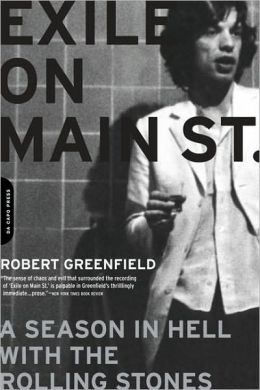Sympathy For The Dullsville

Robert Greenfield’s Exile On Main St. is a season in hell with thirdhand gossip.
Maybe Exile On Main St.: A Season In Hell With The Rolling Stones seems worse than it is because the topic is so full of potential — but I think it’s probably just bad, starting with Greenfield’s insistence on calling Mick Jagger “Michael Philip Jagger.” It’s one of my least favorite celeb-prose affectations, and a book that makes the Stones’ infamous summer of drugs, recording snafus, and infighting on the French Riviera sound like a novelty song heard underwater can’t afford to pants around on the prose level. Greenfield positions himself as an expert (viz. his parenthetical on p. 59 scolding another author for thinking Gram Parsons, not Stephen Stills, threatened Keith Richards with a knife: “Next time you want to check a fact about the Stones, please feel free to call me in the office”), but as far as I could tell, his information about the through-the-looking-glass Villa Nellcote season isn’t gleaned from his own interviews with the band but from the memoirs and reporting of others. His sources page lists interviews, but…not with anyone you’ve heard of.
Greenfield is besotted with the idea of early-’70s Keith Richards, his tardy and polluted indestructibility, and the man’s an icon for good reason, but the starry-eyed descriptions of various car wrecks and smuggling ops get to be a bit much. Ditto p. 19’s extended attempt to fit Anita Pallenberg into a sweaty metaphor involving the Arthurian Round Table, and the resentful judgment of the Stones’ selling out via soap-opera appearances and Super Bowl performances; what is he, 19? Stones tours have reeked of cynical bottom-lining since I was in high school, which was not recently. Sour naïveté on that front is a particularly bad look on what amounts to an extended rewrite of Marianne Faithfull’s memoirs that doesn’t improve the original.
If it’s real insight or new information you want, you won’t get it; you get almost nothing on the music, which is sort of why that hazy summer is notorious in the first place — a record that had the most difficult birth imaginable is a classic, etc. The writing isn’t good, the sourcing isn’t fresh, and the pictures are pretty weak, too. Exile is evidently a labor of love, but it’s too heavy on both.
Tags: Anita Pallenberg books Exile On Main Street: A Season In Hell With The Rolling Stones Gram Parsons Keith Richards Marianne Faithfull Mick Jagger Robert Greenfield Stephen Stills





Michael Philip Jagger?